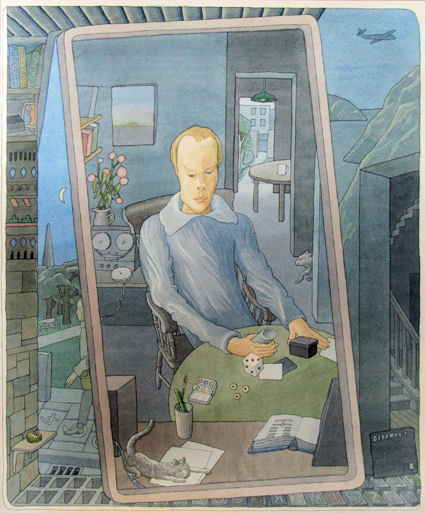
BRIAN ENO: UNTHINKABLE FUTURES
originally published in the Summer 1993 issue of Whole Earth Review
* Everybody becomes so completely cynical about the election process that voter turnout drops to 2 percent (families and relatives of prospective politicians) until finally the "democratic process" is abandoned in favour of a lottery system. Everything immediately improves.
* It turns out that nearly all the conspiracy theories you ever heard were actually true -- that the world really is being run by 150 malevolent men with nasty prejudices.
* Smoking is proven to be good exercise for the lungs.
* Genetic research shows that it is possible to create gifted scientists, great artists, sublime linguists and supreme athletes. Everyone starves to death through lack of farmers, cooks and waiters.
* It becomes clear that there are significant racial differences between people -- that the stereotypes were right after all.
* Ordinary people routinely employ publicists.
* Public relations becomes the biggest profession in wealthy countries.
* Sexual roles reverse: men wear makeup and are aggressively pursued and harassed by women in ill-fitting clothes.
* Video phones inspire a new sexual revolution whereby everybody sits at home doing rude things electronically with everyone else. Productivity slumps; video screens get bigger and bigger.
* Suicide becomes not only commonplace but socially acceptable and even encouraged. People choose when to die: living too long is considered selfish and old-fashioned.
* A new profession -- cosmetic psychiatry -- is born. People visit "plastic psychiatrists" to get interesting neuroses and obsessions added into their makeup.
* Meanwhile, as the cult of youth fades away, plastic surgeons find a profitable new market in making people look interestingly wrinkled, wisely aged, and experientially weatherbeaten. Also, as Oriental aesthetics sweep the West, the traditional values of physiological symmetry and freedom of blemish are seen as naive and uninteresting. Perfect youngsters from Colorado, after years of fretful mirror-gazing, finally save enough money to get their noses put on wrong, or to have a few teeth blackened.
* Tanned skin is once again seen as the mark of peasantry. Sunblock-wearing becomes routine.
* Mass outbreaks of allergies unexpectedly solve all our transportation problems by confining almost everyone to their sealed residences. Telecommunications stocks soar.
* 2025 AD: A social archaeologist discovers a cowshed built from nineteen old Julian Schnabel paintings.
* Abandoned highrise projects become the residence of choice for the new urban chic, changing hands for ever-increasing sums, until finally only lawyers and stockbrokers (skillfully posing as members of dispossessed minority groups) are able to afford them.
* 2010 AD: California elects the first transsexual governor. All public toilets are redesigned at great expense.
* New drugs to pacify children (modern laudanum) are smilingly sold by big pharmaceutical companies (wish they'd hurry up!).
* A new kind of holiday becomes popular: you are dropped by helicopter in an unknown place, with two weeks' supply of food and water. You are assured that you will not see anyone else in this time. There is a panic button just in case.
* Seed companies start selling packets of unpredictable mutants produced by random genetic engineering programmes: "JUST PLANT 'EM AND SEE WHAT COMES UP!" Suburbia is covered with exotic new blooms and giant cucumbers.
* A new concept of "global Darwinism" takes root: people argue for the right of the human species to rid itself of weak specimens. Aid to developing countries ceases. Hospitals become "viability assessment centres" and turn away or terminate poor specimens.
* In reaction, a new definition of viability (based on memes rather than genes) is invoked. People are subjected to exhaustive tests (occupying large amounts of their time) to check the originality and scope of their ideas.
* A new profession, meme-inspector, comes into being.
* Schools abandon the attempt to teach the three Rs, concentrating instead on wacky and controversial "personhood" therapies. Everyone grows up bonkers in some way or another. The whole of the next century is like the late sixties.
* A highly successful new magazine -- Ordinary People, edited by the nonagenarian Studs Terkel -- focuses only on people who have never done anything in particular to deserve attention.
* A new type of artist arises: someone whose task is to gather together existing but overlooked pieces of amateur art, and, by directing attention onto them, to make them important. (This is part of a much larger theory of mine about the new role of curatorship, the big job of the next century.)
* The first Bio-Olympics, where athletes can have anything added to or subtracted from their bodies, take place in 2004.
* News is understood to be a creation of our attention and interests (rather than "the truth") and news shows are redesigned as "thinktanks," where four interesting minds from different disciplines are asked the question, "So what do YOU think happened today?"
* Later, four uninteresting minds (chosen from the pages of Ordinary People magazine) are asked the same questions.
* Direct-mailing organizations carry increasingly complex and subtle character assessments of their targets. To avoid being deluged by the resulting irresistible offers, people routinely begin buying inconsistent products. This is designed to confuse the profilers.* Pro-lifers, meanwhile, discover that women are less likely to miscarry if confined to bed and sedated for the first trimester. Congress bows to pressure and legislates rest.

No comments:
Post a Comment